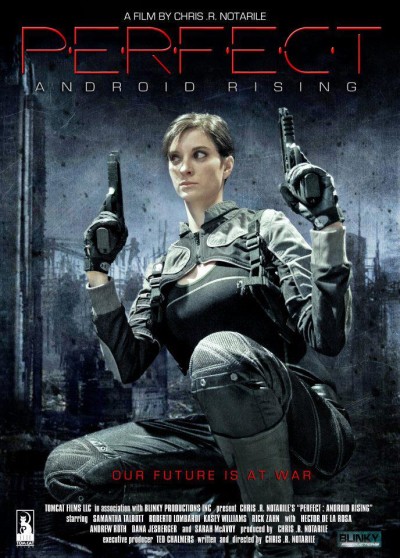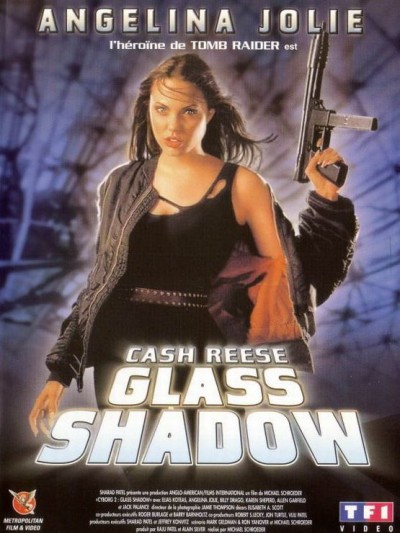
 This series opener is a rousing science-fiction action adventure yarn, far better crafted than today’s average first novel. (I’m guessing that Transcendence Publishing is a real small press, not simply a printing service for self-publishing authors; but in either case, Fisch has taken her craft seriously and given readers a polished work.) The premise appealed to my liking for action-oriented heroines, so I took the opportunity to try out the series by downloading this novel when it was offered free for a day. (I’ll definitely be buying a print copy!)
This series opener is a rousing science-fiction action adventure yarn, far better crafted than today’s average first novel. (I’m guessing that Transcendence Publishing is a real small press, not simply a printing service for self-publishing authors; but in either case, Fisch has taken her craft seriously and given readers a polished work.) The premise appealed to my liking for action-oriented heroines, so I took the opportunity to try out the series by downloading this novel when it was offered free for a day. (I’ll definitely be buying a print copy!)
We have here a tale of interplanetary intrigue, set in a far-future galaxy widely colonized by humans, whose far-flung settlement has brought them into contact with various alien races. Our main series characters belong to one of these, the humanoid Haphezians. They’re not really “super-human,” but they are taller and more muscular than Earth humans, with strength and endurance to match; and with two stomachs, they only need to eat every few days. (Otherwise, they’re physically much like humans, except for more vividness and variation in eye and hair color.) In this novel, we also meet another alien race, the reptilian Sardons. Characters from all three races will interact here, in a galaxy that’s riven by tensions, and sometimes open warfare.
Much of human space is ruled by a powerful Federation. But some fringe human planets like Tantal maintain their independence; and as in the Star Wars universe, the Federation faces resistance from a guerrilla insurgency that has elite fighters, the Nosti, who have special telekinetic powers (unlike the Jedi, theirs are derived from injections every ten years with an illegal psi-enhancing drug). The Haphezian monarchy faces a terrorist insurgency of its own, called Solaris; and some years ago fought a war with the Sardons, who sought to end the Haphezian monopoly on the caura extract trade. Ziva and Aroska serve the Haphezian Crown as agents of the HSP, Haphezian Special Police; and Haphezians are much in demand from other, less combat-capable, peoples as allies or as mercenary soldiers. That’s what’s brought hereditary Tantali governor Enrike Saiffe and his son Jayden on a diplomatic mission to Haphez near the novel’s beginning. Meanwhile, there’s a plot afoot that Ziva and her team will have to discover, and it’s a nasty one.
All of this political background is quickly sketched here in the process of narrating swiftly-moving events, without noticeable info-dumps (I expect it to be developed more in the succeeding books). Haphezian culture is suggested a bit more fully than that of the other two races involved here, but detailed world building isn’t the author’s strong point. Rather, her strong points are tight plotting, smooth and direct prose style that does what she wants it to, well-written action scenes (and a lot of them!), a conflict against a foe whose aims and methods are definitely evil, though that doesn’t mean that we think the Haphezian regime necessarily resembles goodness incarnate; and above all, character development and interrelationships between characters. (We’re not talking about romantic relationships here, but human relationships –and Haphezians are as “human” as you and I in those respects, regardless of how many stomachs they have.) Fisch throws some twists and turns into her plot (one of these I saw coming –but the satisfaction of guessing rightly is part of the fun!) and the last chapters especially are suspenseful right up to the end (reading these, I was glued to the screen!).
Ziva Payvan is a complex, round and dynamic character, embodying more than physical strength, good aim with a gun, and quick reflexes –though she’s got all of those, in enough measure to make her a VERY formidable fighter in any combat situation; you definitely don’t ever want her as an opponent! She’s an intelligent, layered person with a capacity for strong feelings, an inner moral code, and a lot of loyalty; but she’s not necessarily likeable. A product of a rough childhood and adolescence and of a dysfunctional family, she harbors some secrets and has made some bad choices, one of them really dark. And her government has trained her, and used her, as a professional assassin for State-sanctioned killings, with attendant toll on her softer feelings. She’s also abrasive, arrogant, and hot-tempered. But Fisch manages to make her a person you care about.
Aroska Tarbic is also a well-developed character, a strong, tough male well able to handle himself in combat, and with no problems about fighting shoulder-to-shoulder alongside of a woman. (Commendably, Fisch shows both male and female characters routinely taking fighting responsibility, and handling it well.) Indeed, all of the important characters here come to life in the author’s words. Many of the situations and scenes here are powerfully emotionally evocative.
One aspect of the premise here is problematical: Haphez is a highly-developed, tech-savvy planet with a culture that undoubtedly boasts centuries of development. It seems implausible that they wouldn’t have developed a more efficient judicial system, and a more efficient way of carrying out capital punishment, than they apparently have here. We can say the same for a few key details of the plotting that don’t stand strenuous examination too well. And hard-SF buffs will quibble about the impossibility of real-time interplanetary radio communication between planets that are light-years apart, given the relatively slow speed of sound waves. (In Ursula LeGuin’s fictional Hainish universe, an invention called the “ansible” eliminates this problem –we’re not told how, it just does!– but as far as we know, Haphez doesn’t have the ansible.) None of these factors kept me from really liking the book, though! I absolutely plan to continue with the series.
Note: Bad language here (strictly of the d- and h-word sort) is minimal, and there’s no sex, explicit or implied. Very romance-phobic readers can approach this tale without fear.
Author: E. J. Fisch
Publisher: Transcendence Publishing, available through Amazon, both for Kindle and as a printed book.
A version of this review previously appeared on Goodreads.
 A somewhat jumbled mix, this sounds like a film about a punk-rock band but certainly isn’t. It actually starts off playing as a WW2 version of The Terminator, then morphs in the middle to become a mongrel crossbreed of Leon and Nikita, more or less abandoning the whole time-travel aspect entirely. The reasons for this do eventually become clear, yet still leave you feeling like the first third of the film was an entire waste of effort. To begin in the middle, Serena (Marie, who as you can see from the left, even looks like early Anne Parillaud) is a young woman, plucked off the streets by the Boss (Thomson) and raised in his image to become an assassin. She and her boyfriend, Leonard (Neal) are given a very strange mission. A group of scientists have discovered how to manipulate the space-time continuum, allowing them to travel in time, and they have sent someone back to kill Hitler as a child. A counter-group, the RATTs – Researchers Against Time Travel – believe this will just make things worse i.e. allowing someone else, more competent, to rise instead, so through Boss, hire Serena and Leonard to kill the assassin. So how do you stop someone, when those behind them have the ability to control time itself, and counter every move?
A somewhat jumbled mix, this sounds like a film about a punk-rock band but certainly isn’t. It actually starts off playing as a WW2 version of The Terminator, then morphs in the middle to become a mongrel crossbreed of Leon and Nikita, more or less abandoning the whole time-travel aspect entirely. The reasons for this do eventually become clear, yet still leave you feeling like the first third of the film was an entire waste of effort. To begin in the middle, Serena (Marie, who as you can see from the left, even looks like early Anne Parillaud) is a young woman, plucked off the streets by the Boss (Thomson) and raised in his image to become an assassin. She and her boyfriend, Leonard (Neal) are given a very strange mission. A group of scientists have discovered how to manipulate the space-time continuum, allowing them to travel in time, and they have sent someone back to kill Hitler as a child. A counter-group, the RATTs – Researchers Against Time Travel – believe this will just make things worse i.e. allowing someone else, more competent, to rise instead, so through Boss, hire Serena and Leonard to kill the assassin. So how do you stop someone, when those behind them have the ability to control time itself, and counter every move?










 This makes a great deal more sense when you realize it’s actually a sequel, not only to Cymek’s earlier Dark Rising, but also the TV series that followed. The US/Netflix title and blurb cunningly manage to avoid mentioning this, which certainly explains the sense that you have walked into the middle of a story. For instance, none of the characters are apparently fazed by the fact that interdimensional portals have opened, allowing all manner of icky creatures to enter this Earth’s realm from a “Dark Earth”. It’s up to the Rising Dark Agency, a Government department [apparently staffed by about six people] to keep the resulting mayhem in check. Chief among its operatives are Jason Parks (Cannon, a dead-ringer for Dolph Lundgren) and Summer Vale (Kingsley, also the director’s wife), whose combination of human and demon DNA you have probably noticed on the poster. And are perhaps still staring at.
This makes a great deal more sense when you realize it’s actually a sequel, not only to Cymek’s earlier Dark Rising, but also the TV series that followed. The US/Netflix title and blurb cunningly manage to avoid mentioning this, which certainly explains the sense that you have walked into the middle of a story. For instance, none of the characters are apparently fazed by the fact that interdimensional portals have opened, allowing all manner of icky creatures to enter this Earth’s realm from a “Dark Earth”. It’s up to the Rising Dark Agency, a Government department [apparently staffed by about six people] to keep the resulting mayhem in check. Chief among its operatives are Jason Parks (Cannon, a dead-ringer for Dolph Lundgren) and Summer Vale (Kingsley, also the director’s wife), whose combination of human and demon DNA you have probably noticed on the poster. And are perhaps still staring at. Partly to celebrate the 75th birthday of its late creator, Shotaro Ishinomori, the first live-action feature adaptation of his spy series 009-1 was made – it had previously been made into a TV show, during the late sixties, and a 12-episode anime series in 2006. This version was helmed by Sakamoto, best known for his work on the action in Kamen Rider and Power Rangers, but we’ve been a fan since his involvement in 1997’s Drive, with Mark Dacascos, whose fights still hold up very well today. And this is almost as much fun, combining bone-crunching action with more philosophical insights, into what it means to be human.
Partly to celebrate the 75th birthday of its late creator, Shotaro Ishinomori, the first live-action feature adaptation of his spy series 009-1 was made – it had previously been made into a TV show, during the late sixties, and a 12-episode anime series in 2006. This version was helmed by Sakamoto, best known for his work on the action in Kamen Rider and Power Rangers, but we’ve been a fan since his involvement in 1997’s Drive, with Mark Dacascos, whose fights still hold up very well today. And this is almost as much fun, combining bone-crunching action with more philosophical insights, into what it means to be human. Part one was deemed by the qualification panel as falling short of the necessary minimum level for inclusion here, being a mix of poignant drama about an elderly man whose lifelong companion’s battery is running down, and porn. The sequel, however, just about does enough to qualify, albeit while retaining a hefty dose of the latter aspect – and you don’t need to have seen part one either. Here, disgruntled scientist Professor Uegusa (Horiken) hatches a plan to destroy the appearance-based culture of romance, and to finance this sends out his “hostroids”, attractive male androids, in a variety of guises, e.g. office manager, door-to-door salesman, etc. to seduce woman and bilk them of their savings. He also sends them to kill rival researcher Dr. Kouenji, who had been building a countermeasure, in the form of a maid android, Maria (Yoshizawa). Before his death, Kouenji sends Maria to geeky student Shotarou (Haraguchi), but she isn’t ready, needing her “love circuit” activated before she can attain her full potential needed to defeat Uegusa and the hostroids. Can Shotarou manage that final step before the hostroids take him and Maria down?
Part one was deemed by the qualification panel as falling short of the necessary minimum level for inclusion here, being a mix of poignant drama about an elderly man whose lifelong companion’s battery is running down, and porn. The sequel, however, just about does enough to qualify, albeit while retaining a hefty dose of the latter aspect – and you don’t need to have seen part one either. Here, disgruntled scientist Professor Uegusa (Horiken) hatches a plan to destroy the appearance-based culture of romance, and to finance this sends out his “hostroids”, attractive male androids, in a variety of guises, e.g. office manager, door-to-door salesman, etc. to seduce woman and bilk them of their savings. He also sends them to kill rival researcher Dr. Kouenji, who had been building a countermeasure, in the form of a maid android, Maria (Yoshizawa). Before his death, Kouenji sends Maria to geeky student Shotarou (Haraguchi), but she isn’t ready, needing her “love circuit” activated before she can attain her full potential needed to defeat Uegusa and the hostroids. Can Shotarou manage that final step before the hostroids take him and Maria down? I don’t review movies without subtitles very often. This would be a good reason why. I knew very little about this going in: there’s no IMDB entry, no other reviews appear to exist, and virtually the only Google hits are the range of more or dubious sites from which you can download the movie. Subtitles? Don’t make me laugh. That no-one has done so indicates one of two things: no-one was interested enough to do so, or it’s difficult to subtitle a movie with one hand, if you know what I mean, and I think you do. Either way, it leaves me in a difficult spot: any or all of what follows may be wildly inaccurate. However, the chances of anyone ever correcting me are likely slim, so what the hell…
I don’t review movies without subtitles very often. This would be a good reason why. I knew very little about this going in: there’s no IMDB entry, no other reviews appear to exist, and virtually the only Google hits are the range of more or dubious sites from which you can download the movie. Subtitles? Don’t make me laugh. That no-one has done so indicates one of two things: no-one was interested enough to do so, or it’s difficult to subtitle a movie with one hand, if you know what I mean, and I think you do. Either way, it leaves me in a difficult spot: any or all of what follows may be wildly inaccurate. However, the chances of anyone ever correcting me are likely slim, so what the hell…